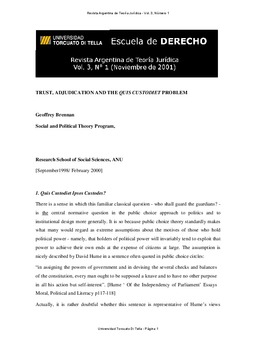| dc.rights.license | https://rightsstatements.org/page/InC/1.0/?language=es | es_AR |
| dc.contributor.author | Brennan, Geoffrey | es_AR |
| dc.date.accessioned | 2018-06-20T17:41:01Z | |
| dc.date.available | 2018-06-20T17:41:01Z | |
| dc.date.issued | 2001-11 | |
| dc.identifier.uri | https://repositorio.utdt.edu/handle/20.500.13098/11002 | |
| dc.description.abstract | There is a sense in which this familiar classical question - who shall guard the guardians? - is the central normative question in the public choice approach to politics and to institutional design more generally. It is so because public choice theory standardly makes what many would regard as extreme assumptions about the motives of those who hold political power - namely, that holders of political power will invariably tend to exploit that power to achieve their own ends at the expense of citizens at large. The assumption is nicely described by David Hume in a sentence often quoted in public choice circles:
“in assigning the powers of government and in devising the several checks and balances of the constitution, every man ought to be supposed a knave and to have no other purpose in all his action but self-interest”. [Hume ‘ Of the Independency of Parliament’ Essays Moral, Political and Literacy p117-118] | es_AR |
| dc.format.extent | 32 p. | es_AR |
| dc.format.medium | application/pdf | es_AR |
| dc.language | eng | es_AR |
| dc.publisher | Universidad Torcuato Di Tella. Escuela de Derecho | es_AR |
| dc.relation.ispartof | Revista Argentina de Teoría Jurídica. Vol. 3, n. 1, (nov. 2001). ISSN: 1851-684X | es_AR |
| dc.relation.hasversion | Versión en español aquí: https://repositorio.utdt.edu/handle/20.500.13098/6291 | es_AR |
| dc.rights | info:eu-repo/semantics/restrictedAccess | es_AR |
| dc.subject | Eleccion de una ocupación | es_AR |
| dc.subject | Política | es_AR |
| dc.title | Trust, adjudication and the quis custodiet problem | es_AR |
| dc.type | info:eu-repo/semantics/article | es_AR |
| dc.type.version | info:eu-repo/semantics/publishedVersion | es_AR |

